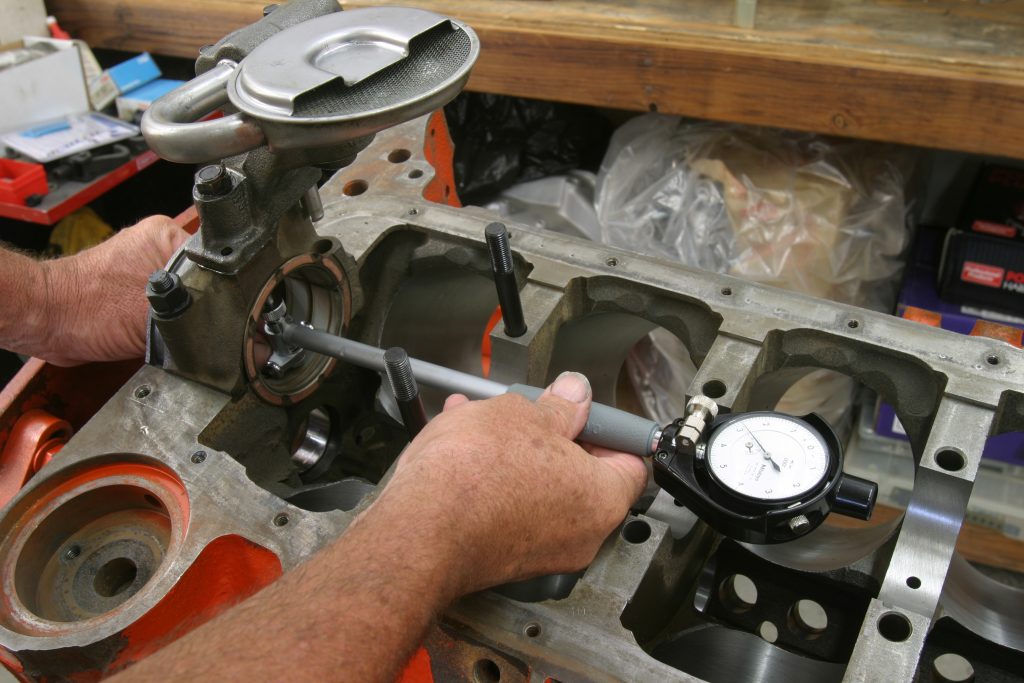I am about to rebuild my first small block Chevy and I’ve been looking at parts and prices and noticed something. The bearing companies list several part numbers for things like main bearings for my 350 Chevy. The prices seem to vary quite a bit – much more than I expected. I’m going to assume that the more expensive bearings are better – but do I need the more expensive bearings?
J.M.
Jeff Smith: I think we can help make some sense out of this. In the early days of the internal combustion engine, bearings were made out of a very soft material called Babbitt which is a very soft alloy of lead, copper, and tin. This material came from the manufacturer not as a bearing insert, but as an ingot that was then melted and poured into a connecting rod and then machined. Today, bearings have evolved into handy inserts go but the material has also changed in the last 20 years.
All bearing inserts start with a steel alloy shell over which the softer bearing material is bonded. We can now categorize bearings into two major groups – aluminum alloy or copper/lead alloy bearings. The aluminum alloy bearings are what the OE’s use for a typical production engine. As a generalized rule of thumb, these bearings are capable of accommodating horsepower up to 100 horsepower-per-liter. In your case, with a 5.7L engine, that would mean roughly 570 horsepower. If the engine were to be pushed to higher power levels, you would then be better to choose the copper/lead alloy bearings.
For many enthusiasts, that’s all they need to know. But let’s go a little deeper and find out why it works out like this. Aluminum (when alloyed with 2 to 3 percent silicon) would seem to be a relatively soft material. In the bearing world, however, aluminum alloy is considered relatively hard, which means it has excellent load carrying capacity with excellent wear characteristics. The down side is that aluminum does not offer good embedability, which means it will not “absorb” a large foreign object like a piece of grit like a much softer copper/lead alloy bearing.
We spoke to a couple of bearing companies about this, and the response was universal. When building a high output engine, it’s best to use the more expensive copper/lead bearings as their softer material will be more accommodating to crankshaft deflection than the much harder aluminum alloy. The softer copper/lead bearings will sacrifice itself (which means it will wear more quickly) under these harsh conditions. Aluminum bearings will tend to peel off or shear material rather than wear, which then sends shards of aluminum bits tearing through the rest of the engine – this is never good.
Regardless of which bearing you choose, always make the effort to determine all the bearing clearances the right way by measuring both journal outside diameter and the inside diameter of the bearing in the housing. This is more work but it is the only way to ensure the clearances are correct.
But don’t let us scare you away from aluminum bearings. All late model production engines are built with aluminum alloy bearings and these engines will make amazing horsepower with these stock bearings. We’ve seen an iron truck LS engine make 800 horsepower on stock bearings and upon disassembly, the bearings look near new.
Since you are contemplating a mild small block street engine, let’s take a look at the differences in price between the types of bearings. We chose to use Speed-Pro bearings for your price comparison, but the price differential is similar with all bearing companies.
We found a set of stock replacement Speed-Pro 4663M aluminum alloy bearings for your 350 Chevy on Summit Racing. The Speed-Pro copper/lead alloy high performance version of that same bearing is PN 139M and cost slightly more than double the aluminum bearings. For those who must have the best, Speed-Pro also offers a coated version of the copper/lead bearing which is C139M. Since there is no discernible power difference between all three of these bearings, the choice is pretty clear. For a mild street engine, the least expensive bearing is an excellent choice but certainly the copper/lead alloy performance bearings will also perform well. The good news is that you really can’t make a bad choice.


Hi im having troble finding parts for my th400 in my 1990 gmc c3500 early model and i was wondering what transmission would slip right in its place and if it is as strong as the th400 and what i would have to do, to do the job right.
I like your arrivals on engine repairs
Great article!
Very nice article. Thanks for sharing.
How are insert bearings manufactured?
What is a plated rod bearing and is it similar to a regular rod bearing?
I have a 1932 Plymouth PB and I woud like to move away from having Babbitts poured.
Is there a way to convert this Lower End to Insert Bearings ?
As an ASE master since 1978, I hate seeing antifreeze in stores that is half water. Antifreeze alone is not fully a coolant until mixed with water. It affects freezing big time and increases the boiling point some. Only water dilutes antifreeze at a 50/50 mixture to achieve coolant status. It should noted on these water bottles with antifreeze that is is impossible to completely drain any block if straight water is used. Many who move from Florida, California, Texas and other southern locals, never heard of “Blue Juice” in the washer solvent tank, while they ran water only in their engines. Many don’t know what their shop did. Yet using 50/50 mix will not reach full protection. It mixes with water below the heads and turns into 20% antifreeze & 80% water or somewhere less than actual coolant. It’s either antifreeze or coolant, but not both. Mis-labeled!